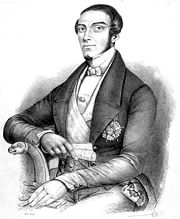
António Bernardo da Costa Cabral, 1st Marquess of Tomar
Encyclopedia

Portugal
Portugal , officially the Portuguese Republic is a country situated in southwestern Europe on the Iberian Peninsula. Portugal is the westernmost country of Europe, and is bordered by the Atlantic Ocean to the West and South and by Spain to the North and East. The Atlantic archipelagos of the...
19th century statesman
Statesman
A statesman is usually a politician or other notable public figure who has had a long and respected career in politics or government at the national and international level. As a term of respect, it is usually left to supporters or commentators to use the term...
.
Born in Fornos de Algodres
Fornos de Algodres
Fornos de Algodres is a municipality and a town in Portugal with a total area of 131.5 km² and a total population of 5,435 inhabitants. The municipality is composed of 16 parishes, and is located in Guarda District, Centro Region, Serra da Estrela Subregion...
he trained as a lawyer
Lawyer
A lawyer, according to Black's Law Dictionary, is "a person learned in the law; as an attorney, counsel or solicitor; a person who is practicing law." Law is the system of rules of conduct established by the sovereign government of a society to correct wrongs, maintain the stability of political...
in Coimbra
Coimbra
Coimbra is a city in the municipality of Coimbra in Portugal. Although it served as the nation's capital during the High Middle Ages, it is better-known for its university, the University of Coimbra, which is one of the oldest in Europe and the oldest academic institution in the...
and was later appointed as a judge. A liberal, he earned a mixed reputation of fear and admiration.
He was appointed Governor of Lisbon
Lisbon
Lisbon is the capital city and largest city of Portugal with a population of 545,245 within its administrative limits on a land area of . The urban area of Lisbon extends beyond the administrative city limits with a population of 3 million on an area of , making it the 9th most populous urban...
in 1836 and was a confidant of Queen Maria II of Portugal. The year he was appointed, he used force to put down radical mobs in Lisbon (the Massacre do Rossio). He restored diplomatic relations with the Vatican
Holy See
The Holy See is the episcopal jurisdiction of the Catholic Church in Rome, in which its Bishop is commonly known as the Pope. It is the preeminent episcopal see of the Catholic Church, forming the central government of the Church. As such, diplomatically, and in other spheres the Holy See acts and...
and re-introduced a conservative Constitutional Charter. Following an 1842 coup d'etat
Coup d'état
A coup d'état state, literally: strike/blow of state)—also known as a coup, putsch, and overthrow—is the sudden, extrajudicial deposition of a government, usually by a small group of the existing state establishment—typically the military—to replace the deposed government with another body; either...
, he was appointed as Minister and Secretary for Royal State Affairs (the equivalent of a today's Interior minister
Interior minister
An interior ministry is a government ministry typically responsible for policing, national security, and immigration matters. The ministry is often headed by a minister of the interior or minister of home affairs...
) in 1843. In 1846 famine
Famine
A famine is a widespread scarcity of food, caused by several factors including crop failure, overpopulation, or government policies. This phenomenon is usually accompanied or followed by regional malnutrition, starvation, epidemic, and increased mortality. Every continent in the world has...
led to the peasant revolt Maria da Fonte in the north of Portugal, and he was removed from office. He fled to England
England
England is a country that is part of the United Kingdom. It shares land borders with Scotland to the north and Wales to the west; the Irish Sea is to the north west, the Celtic Sea to the south west, with the North Sea to the east and the English Channel to the south separating it from continental...
but was restored to power in 1848. Again due to his unpopularity and the now poor economic state of Portugal he was replaced for a second time by the Duque de Saldanha in 1851.

